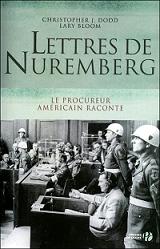July 28, 1945 – October 1946. A trial: that of the Nazi executioners in Nuremberg. An American prosecutor: Thomas J. Dodd, the only civilian among four jurists. And a particular correspondence: the one addressed to his wife who remained in the United States. Discovered forty-five years after their writing by his son, who became a Senator like his father, these Nuremberg letters ultimately bear witness to the encounter of a man with “history in the making.” But also with the unbearable. Hence the letters to his wife through which, beneath the account of the most trivial anecdote and the most demonstrative romantic eagerness, one can discern the necessary outlet and the saving analysis. He confides in a letter dated August 22, 1945: “Being confronted daily with this tragedy,” he says he is “mentally overwhelmed.”
 Other testimonies even more subjective—but could it be otherwise?—arise and illuminate the organization, setup, and conduct of the Tribunal’s work: the description of his journey to reach Nuremberg gives him the opportunity to mention his stop in London where “lost in the ruins of the East End” Britons cast “glances at him that he was unable to sustain.” He is surprised, during his stopover in Paris, to still find “people who manage to stay rich despite the occupation.” His arrival in the city of “devastated Nuremberg,” once a grimly glorious symbol of Nazi celebrations, mirrors back to him the atrocities committed during the Second World War.
Other testimonies even more subjective—but could it be otherwise?—arise and illuminate the organization, setup, and conduct of the Tribunal’s work: the description of his journey to reach Nuremberg gives him the opportunity to mention his stop in London where “lost in the ruins of the East End” Britons cast “glances at him that he was unable to sustain.” He is surprised, during his stopover in Paris, to still find “people who manage to stay rich despite the occupation.” His arrival in the city of “devastated Nuremberg,” once a grimly glorious symbol of Nazi celebrations, mirrors back to him the atrocities committed during the Second World War.
From inside the trial, Thomas J. Dodd particularly describes the “rivalries between allies”: he laments the “gross error of Washington” in choosing a “clique of American colonels” to represent the prosecution, which became overpopulated. He criticizes a Soviet involvement perceived as the “Achilles’ heel of this trial.” His accusations against the Moscow jurists of “delaying” the proceedings echo the more general complaints of the American delegation about “identical if not worse crimes” committed by the Russians that should also be judged. An atmosphere foreshadowing the imminent Cold War period. He notes of the French that they “shine by their absence.”
The interest of the work naturally comes from the narrative, coupled with psychological descriptions, of the interrogations of Alfred Rosenberg, Reich Minister for the Occupied Eastern Territories, Walther Funk who led the Reichsbank, Field Marshal Wilhelm Keitel, Chief of the German Army General Staff, or Joachim Von Ribbentrop, Foreign Minister. But the most troubling pages concern Hermann Göring, who “clearly enjoyed being in the position of Hitler’s successor and the current number one Nazi” before his “arrogance” crumbled during a cross-examination led by Judge Jackson. Additional elements to be added to the archives of the history of this trial, thoroughly scrutinized at the time by the international press. Besides the description of simmering rivalries around the Führer, Thomas J. Dodd dares to show as evidence the “tattooed skins of prisoners” or the “shrunken head of a Polish prisoner,” both transformed into “interior decoration objects.” These letters also share with the public documents that fell into his hands, like the minutes of a secret meeting between Hitler, Blomberg, Von Fritsch, Admiral Raeder, Göring, and Neurath on November 5, 1937, showing that the Nazis did not think they would be “ready for war until between 1943 and 1945.”
The reader will often be surprised at how the author of these letters moves unceremoniously from the intense account of a trial day to the nostalgic, if not naive, mention of a domestic issue of no real importance. This is likely nothing more than a means of distancing, a psychic defense mechanism for a man whose everything indicates he was “never the same” upon his return to the United States.
Christopher J. Dodd, Lary Bloom, “Letters from Nuremberg, the American Prosecutor’s Accounts,” Presses de la cité, 2009.


